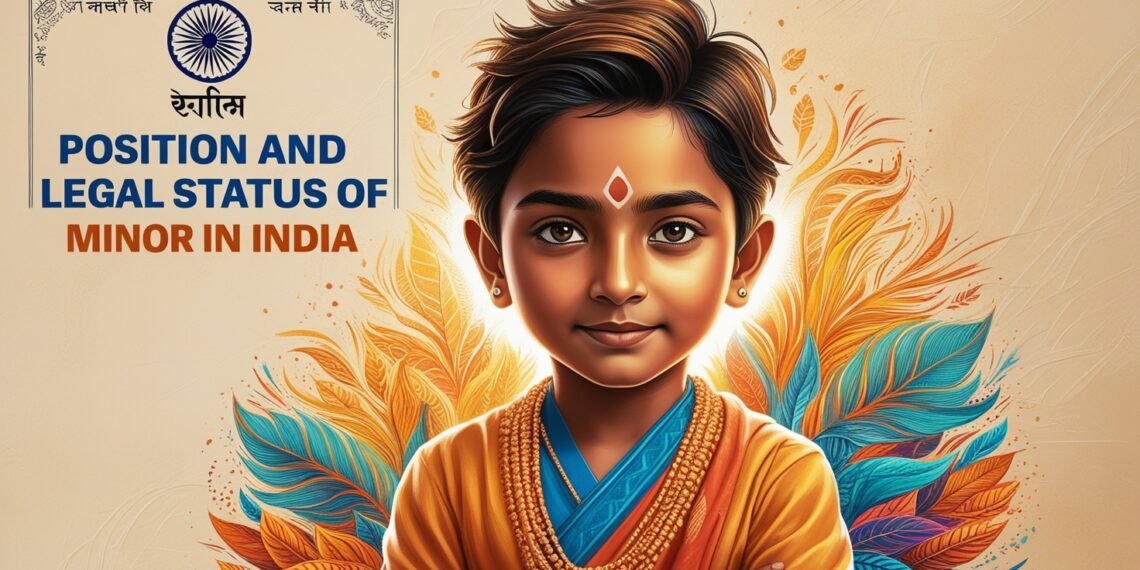AHMAD AMAN KAZMI
BA.LLB(IX SEM)
SHARDA UNIVERSITY
SCHOOL OF LAW (SUSOL)
GEATER NOIDA
WHO IS A MINOR?
A minor is a person who has no legal rights at a particular age. This means a minor is a person who does not have some legal rights at a particular age. Minors do not have full legal capacity as adults have. Generally, minors are not granted the legal rights of adults until they reach the majority age.
In India, the majority age is considered to be 18. Before the age of 18, minors or children are still developing in terms of their nature, health, and knowledge. When minors develop physically and mentally and cross the age of 18, they are considered mature. At that point, they are considered adults and are capable of handling the same legal rights and duties as mature adults. For example, they gain the right to vote, the right to sue, the right to own property, and the capacity to enter into contracts.
However, maturity does not always depend on age. In some cases, minors may have enough maturity and understanding of nature, while adults may not. Every child is different. Children also require certain basic needs, and every child is entitled to equal treatment without discrimination on grounds of sex, race, caste, disability, or religion. Various legal provisions address the status of minors.
POSITION AND LEGAL STATUS OF A MINOR: ACCORDING TO INDIAN CONTRACT ACT, 1872
According to Section 3 of the Indian Contract Act, a person who is a citizen of India and is under the age of 18 is considered a minor. Under this section, a minor’s agreement is void. A minor is not competent to enter into a contract. Section 2 of the Indian Contract Act states that parties to a contract must be competent, which means they must not be of unsound mind, disqualified by law, or minors.
Section 3 of the Indian Majority Act 1875 explains the term “minor” as a person who has not completed 18 years of age. In the case of Mohri Bibi v. Damodardas Ghosh, it was held that any agreement made by a minor is completely void and void ab initio. The court cannot allow specific performance of a contract with a minor because it is void.
POSITION AND LEGAL STATUS OF A MINOR: ACCORDING TO TRANSFER OF PROPERTY ACT, 1882
A minor is not competent to contract under the Transfer of Property Act. However, a minor can accept a gift of immovable property without the intervention of their guardians. According to the Act, property can also be transferred to an unborn child (Section 13 of the Transfer of Property Act, 1882), defining the unborn child as one in the mother’s womb.
For such a transfer, a life interest is created for a life holder, who can enjoy the property on behalf of the unborn child but cannot transfer the property. A minor can acquire immovable property using their funds.
POSITION AND LEGAL STATUS OF A MINOR: ACCORDING TO INDIAN SUCCESSION ACT, 1925
Section 144 of the Indian Succession Act, 1925, provides for the creation of prior interest before the unborn person may become the owner of the property. The created interest will only vest after the unborn child is born alive.
POSITION AND LEGAL STATUS OF A MINOR: ACCORDING TO INDIAN PENAL CODE
According to Section 82 of the Indian Penal Code, a child below the age of 7 receives complete immunity from any criminal liability. A child below 7 is incapable of distinguishing between right and wrong due to their lack of understanding of the consequences of their actions. The mens rea (guilty mind) is not present in such cases.
Section 83 of the Indian Penal Code provides partial immunity for children above the age of 7 and below the age of 12. If they can understand the nature and consequences of their actions, they may be held liable. The maturity and understanding of the child are inferred from the circumstances.
For instance, in Krishna Bhagwan v. State of Bihar, it was held that if the accused was below the age of 7 at the time of the crime, they could not be held liable unless they showed sufficient maturity to understand the nature of their actions. In Marsh v. Loader, a child caught stealing was discharged because they were below 7 years old and not liable.
MATURITY OF UNDERSTANDING
For children aged between 7 and 12 years, liability depends on their maturity level.
Example: A child of 10 years who cannot understand the nature of their actions may be absolved of liability. But another child of 9 years, who is more mature and understands the consequences, may be held liable.
CONCLUSION
In India, the legal age of majority is generally 18, as below this age, a person is not deemed mature enough to understand the nature of their actions. Minors are not granted rights like the right to vote. However, maturity is not solely determined by age. Some minors may demonstrate greater understanding than some adults. Every child has certain fundamental rights, including the right to life under Article 21 of the Indian Constitution, and children are entitled to a safe environment, healthcare, and education, free from discrimination based on sex, race, caste, disability, or religion.
REFERENCES
- The minor is a person who has not completed their 18 years of age.
- Mohri Bibi vs. Damodardas Ghosh (1903) 30 Cal. 539.
- Krishna Bhagwan v. State of Bihar, AIR 1989 PAT 217.
- Marsh v. Loader, (1863) 14 CBNS 535.



